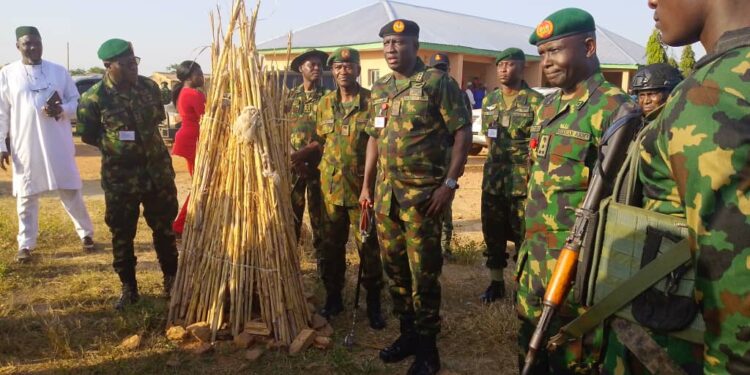The Chief of Army Staff, Lieutenant General Waidi Shaibu, has directed troops of Operation FANSAN YANMA to pursue an unrelenting search-and-rescue mission for the 25 female students kidnapped from Government Girls Comprehensive Senior Secondary School in Maga, Danko/Wasagu area of Kebbi State.
The directive came during a high-stakes visit to the state following Monday’s deadly raid in which gunmen killed the school’s Vice Principal, Hassan Yakubu Makuku, before abducting the students in an attack that has sent shockwaves through the education sector.
Speaking directly to soldiers deployed for the rescue operation, General Shaibu made clear that there would be no letup until every abducted student is recovered safely. “We must find these children,” the army chief declared with firm resolve.
According to counter-insurgency analyst Zagazola Makama, Shaibu arrived in Kebbi State accompanied by a team of principal staff officers from Army Headquarters. He immediately convened an operational meeting with frontline commanders before addressing troops already engaged in combing forests and suspected bandit routes.
The army chief emphasized that determination and swift action were non-negotiable requirements for the mission, instructing officers to maintain continuous pressure on the criminals through round-the-clock operations.
“You must continue day and night fighting. For the commanders here, you must leverage intelligence to conduct intelligence-based missions. It has become a pattern that bandits target soft targets. If they know you are in a location, they will not come there. And if they face you, you can defeat them, can’t you?” Shaibu told the assembled troops.
He stressed that responding promptly to intelligence reports was essential to successfully tracking and intercepting the bandits before they could move the students deeper into remote hideouts. “This is not just about our image; it is about doing our job properly,” the COAS added, framing the rescue as a fundamental duty rather than merely a public relations exercise.
In a significant development, General Shaibu also held discussions with local vigilantes and hunters who have been assisting security forces in the operation. He described these community-based security actors as “indispensable partners” whose intimate knowledge of the terrain is crucial to successful counter-banditry missions.
“If we have people like you, it is you who will work with us and provide local intelligence. You know these forests, and you are the ones to tell us where the criminals are. Your hunters should storm the nooks and crannies of these forests. Soldiers will also join you. We are counting on you to work with us to bring lasting peace,” the army chief told the vigilante groups.
His remarks underscore a growing recognition within military circles that conventional forces operating in unfamiliar terrain require the support of local security actors who understand forest pathways, hideouts, and the movement patterns of criminal groups.
Shaibu expressed firm determination that the military would not allow criminals to use fear as a weapon to disrupt education in vulnerable communities. “What these evil people are trying to do is scare children from going to school. Let every man know we will not allow that,” he stated emphatically.
The COAS commended the vigilantes for their bravery in supporting security operations and assured them of continued military backing, including logistical support and coordination to maximize their effectiveness on the ground.
Prior to addressing the troops, General Shaibu paid a condolence visit to Abubakar Ibrahim Allaje, the traditional ruler of Danko, and Rabi Musa Magaji, the principal of Government Girls Comprehensive Senior Secondary School, Maga, to express sympathy over the attack and its devastating consequences.
During these meetings, he provided assurances of the military’s unwavering commitment to rescuing the abducted girls and restoring security to the traumatized community.
“We are fully committed. We will not relent. The safety of these children is a national priority, and we are deploying every resource to ensure they return home safely,” Shaibu told the community leaders and school authorities.
His visit to Kebbi State represents the highest-level military response to a school abduction in recent times, signaling that the armed forces are treating the incident as a priority mission requiring direct supervision from the service chief.
The order to “leave no stone unturned” suggests that troops have been given wide latitude to pursue all available leads and employ whatever tactics are necessary—within legal and ethical boundaries—to locate and recover the students.
Security analysts note that the first 48 to 72 hours following a mass abduction are typically the most critical for successful rescue operations, as bandits attempt to move captives to more secure locations and begin negotiations for ransom payments.
The deployment of additional troops, combined with the mobilization of local hunters and vigilantes who can navigate the difficult forest terrain, represents a comprehensive approach aimed at cutting off escape routes and pressuring the kidnappers before they can consolidate their position.
As rescue operations intensify across suspected bandit corridors in Kebbi State, anxious parents and community members await news of their daughters’ whereabouts, hoping that the military’s aggressive posture will translate into swift action that brings the girls home unharmed.
The attack on the Maga school marks yet another painful chapter in Nigeria’s ongoing struggle with banditry in the northwest, where criminal groups have made abducting students a lucrative business model despite repeated government promises to secure educational institutions and end the menace.




















